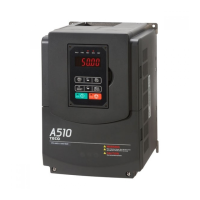4-238
11-02 Random PWM Function Selection
Range
0:
Disable
1: Enable
11-02=0: Random PWM control disabled.
11-02=1: Random PWM control enabled. Random PWM control can improve the ‘metal’ noise produced by the
motor, more comfortable for the human ear. At the same time, Random PWM also limits RFI noise to a minimum
level. The default setting of Random PWM control is disabled. Random PWM cannot be set if carrier frequency
set in 11-01 is higher than 8 kHz.
11-03 Automatic carrier lowering selection
Range
0:
Disable
1: Enable
11-03=0: Automatic carrier frequency reduction during an overheat condition is disabled.
11-03=1:
Carrier frequency is automatically lowered in case the inverter heatsink overheated and will return to
carrier frequency set in parameter 11-01 when the inverter temperature returns to normal. See section 3 for more
information.
11-04 S curve time setting at the start of acceleration
11-05 S curve time setting at the end of acceleration
11-06 S curve time setting at the start of deceleration
11-07 S curve time setting at the end of deceleration
Range
0.00~2.50 Sec
The S curve function for acceleration / deceleration is used to reduce mechanical impact caused by the load
during momentary starting and stopping of the inverter. To use the S curve function set the time for acceleration
start point (11-04), acceleration end point (11-05), deceleration start point (11-06) and deceleration end point
(11-07). Refer to figure 4.4.85 for more information.
Figure 4.4.85 S curve characteristic
Total acceleration and deceleration time when the S curve is used:
Accelerating time = Accelerating time 1 (or 2) + (11-04) + (11-05)
2
Deceleration time = Deceleration time 1 (or 2) + (11-06) + (11-07)
2

